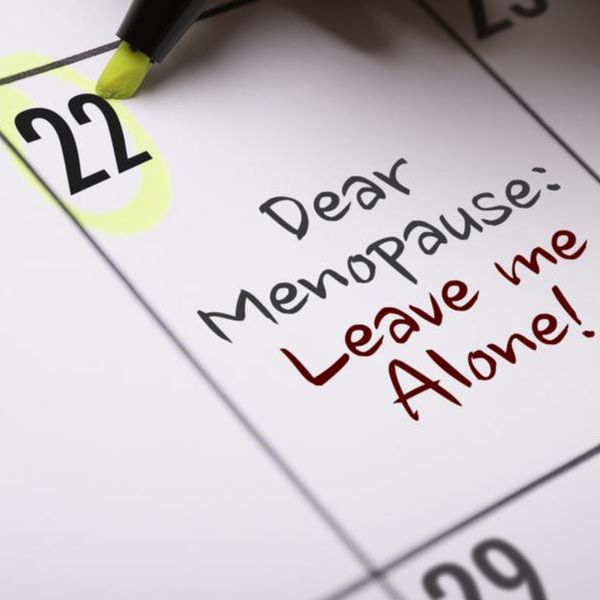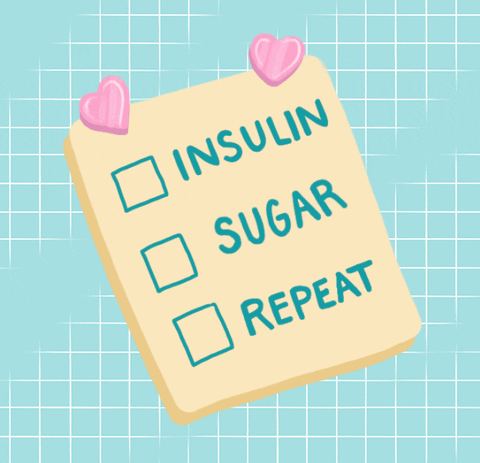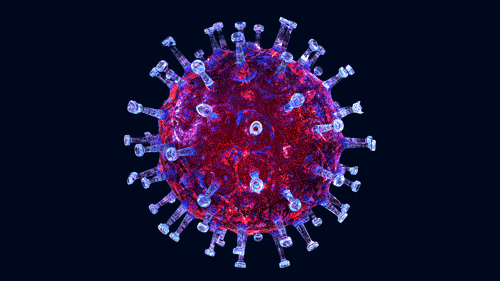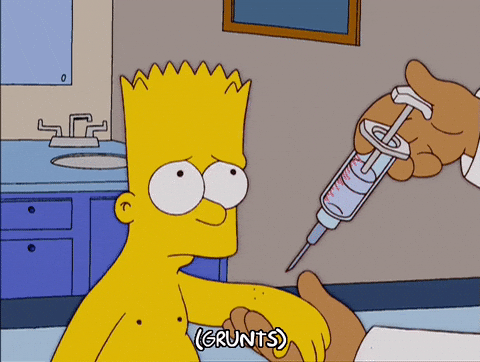
You know how they say that the two things that are certain in life are death and taxes? Yeah, well, if you're a woman, another thing that is sure to head your way is menopause. It's that time of life (on average, it happens for women once they turn 51) when we have gone a full 12 months without a menstrual cycle (so long as there may not have been underlying health issues that could play a valid role). It comes as the direct result of your body not producing enough estrogen for your ovaries to release an egg every month. As a result, with menopause comes the inability to conceive a child.
The reality is that even before menopause transpires, your body typically goes through stages of transition for somewhere between 7-10 years (although "official" perimenopause typically lasts for no more than four) beforehand. Your estrogen and progesterone levels tend to be on a serious roller coaster ride. Your menstrual cycle may be super irregular or spotty as all get out. You might experience hot flashes, night sweats, insomnia, weight gain, a slower metabolism, headaches, thinning hair, dry skin, breasts that are less "perky" and a lower libido. It's a lot, I know. The reason why I'm mentioning all of this is because there is oftentimes a misconception that these things are menopause when the reality is these are what can happen as you're headed into menopause. It's oftentimes referred to as perimenopause. What happens to us after menopause happens—well, we're going to look into one thing specifically today.
If you're someone who either fears the thought of menopause or you've recently gone through it and you're freaking out a bit because your sex life doesn't seem to be quite like it used to, get yourself some bing cherries or a peach (more on why in a sec) and I'll share with you some facts that can make going through this very natural stage of life so much easier to bear.
1. A Change Is Definitely Gonna Come
Menopause is interesting in the sense that, unless you had one or both of your ovaries removed when you were very young, you will definitely experience menopause at some point in your life. That doesn't mean that you'll have to go through all of the symptoms that I shared that lead up to menopause (some women experience little to none of 'em); however, you should pretty much put yourself in the mindset that some sort of change will happen—even if it's just that fact that, eventually, your period will come to an end.
And since that is due to the fact that your body is producing less estrogen (along with less testosterone and progesterone) than it used to, it's important to prepare yourself that it could definitely affect your sex drive. This includes taking longer to be aroused; your clitoris not getting as erect (or erect as quickly) as it used to; your vagina being drier; your vaginal walls becoming thinner (we'll talk more about this in a bit) and you having a more difficult time experiencing an orgasm (if you experience one at all). This actually makes a lot of sense because most of us are our horniest during our ovulation period (when our body passes an egg and awaits a sperm to fertilize it). When eggs don't pass anymore, ovulation ceases and a spike in sexual desire can tank.
I know. What a depressing way to start off an article. Yet the reality is that when you know what could happen beforehand, you can actually prepare for it. And the less shocking things are, the less traumatized you'll be and the more you'll be able to accept all of this as a new season that requires a few adjustments. Let's keep going so that you can know what some of those adjustments entail.
2. A Dip in Estrogen Can Affect Your Libido During Menopause
The reality is that estrogen, progesterone and testosterone are all natural hormones that your body produces. When there are higher levels of them in your system, that directly increases vaginal lubrication and sexual desire overall. When there is a drop in any of these hormones or there is a hormonal imbalance, all of the things that I mentioned in the intro can transpire. That's the bad news. The good news is there's estrogen therapy that is available. Your doctor may prescribe some estrogen pills, patches or even a topical cream, suppository or vaginal ring (you can read more about some of those options here).
Because I have a lot of natural health people in my space, something else that I'm aware of is wild yam extract or cream. It is an all-natural alternative to traditional estrogen therapy. Some women sing highly of its praises. If you want to avoid the potential side effects of what can sometimes come with estrogen therapy, it's at least worth looking into. Red clover and flaxseed supplements can also be helpful, considering they are phytoestrogens which is a form of estrogen. Whatever you decide to do, just remember that less estrogen tends to equal a lower desire for sex, so when menopause happens, more estrogen should be added to balance everything back out as much as possible.
3. You May Experience Some Discomfort (or Pain)
Something that a dip in estrogen can do is actually cause your vaginal tissues to become thinner and sometimes inflamed. The cause of this is the result of something known as vaginal atrophy (which can happen during menopause, breastfeeding, a partial hysterectomy or if you're undergoing cancer treatments). Along with it, other symptoms include vaginal dryness, vaginal burning, frequent urination, an uptick in UTIs (urinary tract infections), shortening and tightening of your vaginal canal, and discomfort or even pain during intercourse. If any of this becomes an issue for you, make an appointment to see your doctor so that you can be properly diagnosed and treated. Sometimes estrogen treatments or bringing lubrication into the bedroom can nip a lot of this right in the bud. And speaking of lube, the next point.
4. Getting Wet Can Be More of a Challenge in Menopause
Remember how I just stated that vaginal atrophy can lead to vaginal dryness? Sex when you're not wet (enough) definitely doesn't feel good which is why, when you're going through the transition of menopause, lubrication should become one of your best friends. Also, make sure that you're getting plenty of water (being dehydrated can affect things down below too) and that you eat foods that are known to keep your body moisturized (check out "These Foods Will Give Your Skin & Hair The Moisture They Crave"). Oh, and you might want to keep some Vitamin E oil close by. Not only can breaking open a capsule help to lubricate your vulva but it can also soothe your vaginal lining without irritating it as well. There's another thing that can help you to get wetter. It's the best thing you've probably read thus far.
5. Foreplay Will Probably Need to Be Extended
I've shared in other sex-related articles on this platform before that while it takes men somewhere around five minutes to climax, it typically takes us more like 25. Foreplay is what helps us to become sexually aroused and, once menopause happens, you'll probably need extended sessions of it. Kissing. Fondling. Some of us actually consider oral sex to be foreplay (kinda like the appetizer before the full course meal). Bringing in exercises such as orgasmic meditation as a build-up to mindful orgasms can be super helpful too.
Really, when you stop to think about it, needing more time for foreplay in order to get aroused isn't just about menopause. When you were in your 20s, the "jackrabbit sex" that a lot of us engaged in isn't appealing after 35 or so anyway. You want more time to enjoy your partner, to get all five of your senses (touch, sight, taste, smell, and hearing) involved in the experience as much as possible and to simply relax and go with the flow (pun intended and not intended at the same time). Hmph. I once had a wife tell me that she needed to use her own spit to make herself wet before sex (what in the world?!) and it had nothing to do with menopause or an underlying health issue. Her husband was just selfish AF in bed. They're divorced now.
Hopefully, as we mature, we become better lovers because we know that it's about more than just "getting to the end". If anything, menopause is a glaring reminder of this very fact. More foreplay is a good—and beneficial—thing. Get into it.
6. You’ll Need to Make Some Minor Bedroom Adjustments
Probably one of the most common symptoms that you hear about when the topic of menopause comes up is hot flashes (for the record, other things that lead to them like diabetes, birth control, an underactive thyroid, radiation therapy, pregnancy and stress). The reason behind it is, when estrogen tanks, it makes your body become way more sensitive to the shifts in body temperature (our hypothalamus) than it used to be. And here's the thing—while hot flashes are the most common (and intense) as you head into menopause, they can sometimes last well into your 80s (crazy, right?).
I don't know about y'all, but I hate a hot bedroom and shoot, while you're having sex (if it's good sex), there's a pretty good chance that it's gonna get you all hot 'n bothered, literally, on its own. You can't really control when a hot flash comes along, which is why I recommend making some bedroom adjustments once menopause happens. Turn down your thermostat to around 65 degrees. Install a ceiling fan, if you don't have one. Keep some cool water nearby. Limit how much alcohol you drink if sex is in the plans that day (because alcohol is something else that can bring along a hot flash; caffeine can too). Go with some organic cotton bedding (it's a "breathable" fabric) and sleep naked as much as you can. Sometimes the urge is there but things like a hot flash can still make you take a hard pass. Being ready for when one comes along could be another "hack" that can make sex way more pleasant for you.
7. There Are Natural Ways to Balance Your Hormones During Menopause
Menopause will definitely have your hormones going all over the place. Again, since your ovaries produce less estrogen (and progesterone), it not only takes a toll on your sex drive, it can cause you not to feel as great as you normally do. For instance, it's not uncommon for low estrogen levels to lead to depression-related symptoms and for low progesterone to lead to anxiety and migraines. Who wants to have sex when any of this is going on? That's why it's also a good idea to put your body on a regimen that can help to balance your hormone levels out naturally.
Things like reducing your sugar intake; exercises 2-3 times (for 30-45 minutes) a week; reducing your stress levels; consuming more protein; eating natural estrogen-boosting foods like bing cherries, peaches, sesame seeds, garlic, wholegrain bread, alfalfa sprouts, carrots, apples and coffee; taking an evening primrose oil supplement; taking a Vitamin B and C supplement and eating foods that are high in Vitamin E such as sunflower seeds, almonds, spinach, collard greens, red bell peppers and wheat germ oil—all of this will help to balance your hormones so that you'll feel more like your "old" self and more in the mood for sex.
8. Pay Close Attention to Your Mental and Emotional Well-Being
As a doula, something that I recommend my clients do is see a therapist/counselor/life coach at some point during their first year of being a new mom. The main reason why is because, no matter how awesome the season of being a new mommy can be, there is still some grieving that must happen and some processing that needs to work out as you release a lot of "what was" for "what is". Because the reality is, a baby changes a lot of things; sometimes you need help knowing how to work through your emotions about that.
In many ways, the same point applies to menopause. As a woman in my 40s who still has a period like clockwork (chile) and has made peace about not conceiving children, there is a part of me that absolutely cannot wait to retire this menstrual cup of mine. At the same time, I know it's also one thing to choose to not have kids; it's another to not be able to anymore.
Menopause is a common thing that is nothing to be embarrassed about, ashamed of or even uncomfortable with. Still, it's a big enough life shift that I suggest paying very close attention to how you are feeling mentally and emotionally too. See a professional. Talk to your girlfriends who may have already experienced this life phase. Be open with your partner about your feelings and concerns. While a lot of physical things can alter sex after menopause, the reality is that a lot of psychological stuff tends to go far too overlooked too.
9. Men Go Through Something Known As Andropause
Don't let the media (or the men in your life) fool you. While we're over here going through menopause, men have their own shift that's going on. It's called andropause. It's the time in a man's life (usually around 50) when their testosterone levels significantly drop. As a result, it can lead to fatigue, sadness, insomnia, increased body fat, decreased bone density, less muscle mass, less body hair, hot flashes (yes, chile)—and erectile dysfunction and a low(er) libido. If you suspect that the man in your life may be going through "the change", the best way to confirm it is for him to have a blood test in order to check his testosterone levels. Sometimes, simple things like altering his diet, getting more exercise, getting more sleep and eating testosterone-boosting foods such as tuna, beef, egg yolks, beans and fortified cereals are all that he will need. Other times, testosterone therapy may literally be just what the doctor orders.
10. Your Sex Life Can Still Be Great During Menopause
Yeah, this was a lot to take in. Believe me, I know. Yet let's make sure to end this on a really positive note. Fairly recently, I laughed as I read some social media comments (a lot of folks were haters, to be honest) about actor Suzanne Somers talking about how much she and her hubby get it in, to this day. At 74, she said it's "three times before noon" (good for you, girl!).
Now before you think she's embellishing or that's close to being ridiculous, it's been reported that two-thirds of people over 65 are still extremely interested in sex; 40 percent of people between 65-80 are still sexually active; half between 57-75 still give and/or receive oral sex (one-third between 75-85 do), and 25 percent over the age of 70 are having sex at least once a week.
Moral of the story: Aging is a part of life and, for women, menopause is sure. Neither has to be a death sentence for your libido or your sex life, though. 50s ain't old and, as you can see, folks close to their 90s are still thriving in the bedroom. At the end of the day, there's nothing to fear about menopause. Just learn more about what comes with it, factor in what you personally need to do and you should be all good. Literally. #wink
Join our xoTribe, an exclusive community dedicated to YOU and your stories and all things xoNecole. Be a part of a growing community of women from all over the world who come together to uplift, inspire, and inform each other on all things related to the glow up.
Featured image by Shutterstock
- 12 Vagina Hacks You Need - xoNecole: Women's Interest, Love ... ›
- How Do I Know If My Sex Drive Is Low? And If So, What Causes It ... ›
- First Time Sex Wedding Night Tips - xoNecole: Women's Interest ... ›
- 7 Things Married Couples Do To Damage Their Sex Lives & Don't ... ›
- Foods To Eat Improve Sex Life - xoNecole: Women's Interest, Love ... ›
- High Sex Drive, Definition and Meaning - xoNecole: Women's Interest, Love, Wellness, Beauty ›
- The Difference Between Your Period And Ovulation - xoNecole: Women's Interest, Love, Wellness, Beauty ›
- When Are Women The Horniest? Science Explains. - xoNecole: Women's Interest, Love, Wellness, Beauty ›
- What Happens To Your Vagina When You Stop Having Sex? - xoNecole ›
This Is How To Keep 'Holiday Season Stress' From Infecting Your Relationship
Hmph. Maybe it’s just me, but it seems like there is something really weird happening in the fall season air (because winter doesn’t officially begin until December 21) that cuddle season is in full swing while break-up season is as well. In fact, did you know that break-ups are so popular during the holiday season that December 11 is deemed Break-Up Day?
The reasons why relationships shift around this time vary; however, I did both roll my eyes and chuckle when I read that a very popular one is because it’s an easy way to get out of getting one’s significant other a Christmas present. SMDH.
Anyway, I personally think that the less shallow folks out here may contemplate calling things “quits” or they at least distance themselves a bit from their partner (and what I’m referring to is serious relationships) due to all of the stress and strain that oftentimes comes with the holidays whether it be financial, familial, due to their tight schedules or something else.
Listen, I would hate for you and your man to miss the fun and happiness of experiencing this time of year, all because you are so overwhelmed or irritated that you can’t really enjoy it. That’s why I have a few practical tips for how to avoid allowing the typical holiday season stress from INFECTING your relationship.
Manage Your Expectations
 Giphy
GiphyUnmanaged expectations. If there is a main reason why the holiday season tends to be so stress-filled for so many people, I’d bet good money that this is the cause. And when you’re in a long-term relationship, expectations can manifest themselves in all sorts of cryptic and/or unexpected ways. You might have relatives who assume that you are going to be with them for Thanksgiving or Christmas when you have other plans in mind. You might be thinking that you are going to spend one amount for presents while your man is thinking something totally different. When it comes to scheduling, your signals may be crossed.
And you know what? To all of these scenarios, this is where clear and consistent communication come in. Don’t assume anything. Don’t dictate anything either. From now until New Year’s, mutually decide to check in once a week, just to make sure that you are both on the same page as it relates to the holidays and what you both are thinking will come along with it. The less blindsided you both feel, the less stressed out you will be. Trust me on this.
Set (and Keep) a Budget
 Giphy
GiphyOkay, so I read that last year, 36 percent of Americans incurred some type of holiday-related debt. Hmph. Last year, there was still some sense of normalcy in this country, chile, so I can only imagine what finances are gonna look like over the next several weeks. That said, since I don’t know a lot of people who don’t find being broke stressful, make sure that you and your bae set a budget and then stick to it this year — no ifs, ands or buts.
Because really, y’all — it doesn’t make sense to deplete savings and/or max out credit cards for a few days of giggles only to be damn near losing your mind because you don’t know how to make ends meet come Dr. Martin Luther King, Jr. Day.
And by the way, this tip doesn’t just speak to things like food and gifts; I also mean travel. If it doesn’t make a ton of sense (or cents) to be all over the place this year — DON’T BE.
Keep Matthew 5:37 at the Forefront
 Giphy
GiphyIf off the top of your head, you don’t know what Matthew 5:37 says, no worries, here ya go: “But let your ‘Yes’ be ‘Yes,’ and your ‘No,’ ‘No.’ For whatever is more than these is from the evil one.” That verse right there? Oh, it’s a boundaries lifesaver! I say that because do you see “maybe” or “I’ll think about it” in there? Nope. LOL. It says that you should tell people “yes” or “no” and leave it at that — and that complements Anne Lamott’s quote, “’No’ is a complete sentence” impeccably well. Yeah, you’ve got to remember that anything beyond a yes or no to a request is privileged information; you don’t owe anyone details or an explanation.
Besides, if you are really honest with yourself, when someone asks you something and you give a “Umm, let me think about it” kind of reply, more times than not, you already know what your answer is going to be — so why not let you both off of the hook? Give your response. Commit to that. And let everyone (including yourself) get on with their lives and schedules.
I promise you that when it comes to those holiday parties, you are pissing more folks off by not RSVP’ing or doing so and not showing up than just saying, “Thank you but not this year” off the rip.
Remember That Your Personal Space Is Privilege Not a Right
 Giphy
GiphyA friend of mine recently bought a new house and invited me over to come see it. He’s a single man with no children, so as I was taking in all of the space that he had, especially as I walked through his finished basement, I joked about relatives coming to live with him. “Hell no” and “absolutely not” were pretty much his immediate responses as he went on to say that some folks even had the nerve to be offended when he told them that he had no intentions on taking DNA in.
Ain’t it wild how people think that your stuff is their right? And yes, that brings me to my next point. Your home is your sanctuary space. If you want to host folks this year — cool. If not, ALSO COOL. Please don’t let folks (family included) guilt you into how they want you to act or even into what they would do if the shoe was on the other foot. You are not them — and as one of my favorite quotes states, “If two people were exactly alike, one of them would be unnecessary.” (A man by the name Larry Dixon said that.)
Hell, my friends? They know that I am good for sending them random things that they need or even want all throughout the year. Coming over to hang out at my pace, though. Uh-uh. Chalk it up to being a card-carrying member of the ambivert club yet I like keeping my living space personal — and I sleep like a baby, each and every night, for feeling that way.
Always remember that your space, your time, your resources, your energy and shoot, yourself period (including your relationship), are all things that are your own. You get to choose how, when and why you want to share them. The holiday season is certainly no exception.
Cultivate Some “You Two Only” Traditions
 Giphy
GiphyIt’s not uncommon for some couples to hit me up after the holiday season to “detox.” Sometimes it’s due to the financial drama (and sometimes trauma) that they experienced. Sometimes it’s because they allowed their relatives (especially in-laws) to get more into their personal business than they should’ve. More than anything, though, it tends to be because they didn’t get enough quality time together and so ended up feeling “disconnected.”
Please don’t let that happen. Listen, I’m not even a holidays kind of woman and yet, I will absolutely sit myself down with some hot chocolate and chocolate chip cookies to enjoy a Hallmark holiday film or two. Aside from the fact that most of them are lighthearted and sweet, I also like that they usually focus on couples loving on each other amidst all of the holiday beauty and ambiance — which is something that all couples should set aside some time to do.
Maybe it’s a vacation. Maybe it’s a staycation. Or maybe it’s my personal favorite, A SEXCATION. Whether it’s for a few days, the weekend or even overnight — don’t you let the holidays go by without setting aside time for you and your man to celebrate one another. Don’t you dare (check out “Are You Ready To Have Some Very Merry 'Christmas Sex'?”).
GET. SOME. REST.
 Giphy
GiphyI once read that 8 out of 10 people get stressed out over the holidays and 3 out of 10 lose sleep during to it — and when you’re stress-filled and sleep-deprived, that can absolutely lead to hypersensitivity, making mountains out of molehills and even not being in the mood for sex.
Your relationship can’t afford to go through any of this, so definitely make sure to prioritize rest. I don’t care how unrealistic it might seem during this time, sleep should never be seen as a luxury; it will always and forever be a great necessity.
That said, try to get no less than six hours of shut-eye in (check out “6 Fascinating Ways Sex And Sleep Definitely Go Hand In Hand”) and even ask your bae to take a nap with you sometimes (check out “Wanna Have Some Next-Level Sex? Take A Nap, Sis.”). Not only will sleep help to restore your mind, body and spirit but, when it’s with your partner, it’s an act of intimacy that can make you both feel super connected, even in the midst of what might feel like chaos.
___
Holiday season stress is real. Still, never give it the permission or power to throw your relationship off. Put you and your man first and let the holidays be what they are gonna be, chile.
Let’s make things inbox official! Sign up for the xoNecole newsletter for love, wellness, career, and exclusive content delivered straight to your inbox.
Featured image by Shutterstock
While doing a podcast interview a couple of weeks ago, when I said my age, the interviewer complimented me by saying that what I said is not what they would’ve guessed. When they asked what the secret was, the first thing that came out of my mouth was, “Oh, I’m gonna take me a nap.”
I adore sleep. I’ve said before that it’s like what Six Flags is to some people. And really, it’s just a plus that there are so many health benefits from getting plenty of rest. Beauty-wise, science does reveal that getting no less than seven hours a night can slow down signs of aging. Know what else? There are some direct things that sleep — and the lack thereof — can do to your immunity as well.
And so, since this is the time of year when catching a cold (and/or the flu) is common, let’s talk about the impact that sleep (and again, a lack thereof) has on your immune system. That way, you can remain as healthy as possible during the fall and winter seasons.
1. Less Sleep Means More Colds
 Giphy
GiphyLike I stated in the intro, I’m pretty sure you’ve heard somewhere that the fall and winter are the seasons when people are most susceptible to catching a cold or coming down with the flu. And that’s exactly why I thought I would start this all off by sharing the fact that some studies reveal that if you get less than six hours of sleep, on a consistent basis, you end up making yourself more vulnerable to coming down with both. In fact, some research says that only 18 percent of people who get six-plus hours of rest caught a cold while almost 40 percent who got less than that did.
The logic behind it all is sleep gives your body time to build up the proteins and cells (like cytokines and T-cells) that you need to fight off certain viruses. So, if nothing bothers you more than having a stuffy nose or stubborn cough when it’s cold outside, getting more sleep is one way to prevent that from happening to you.
2. Less Sleep Means More Allergy Symptoms
 Giphy
GiphyAt the end of the day, an allergy is basically what transpires whenever your immune system “overreacts” to something that other people’s systems do not. And since sleep is what helps to keep your immune system nice and strong — well, I’m sure you get how less allergy-related symptoms and more sleep go hand in hand. Also, since sleep helps to decrease bodily inflammation (more on that in a bit) and inflammation can also intensify allergy symptoms, that’s just one more reason to get as much shut-eye as possible.
3. Less Sleep Means Potential Diabetes and Heart Disease
 Giphy
GiphyDid you know that in 2024, Black women were diagnosed with diabetes 24 percent more than any other adult demographic. Also, it continues to be a reality that heart disease is the leading cause of death for Black women. These two sobering statistics alone should be enough of an incentive to do whatever you can to keep the risk of diabetes and heart disease way down.
One way to do that is by getting more sleep. Aside from the fact that sleep strengthens your immune system to where it is easier for you to fight off illness and diseases, sleep can keep your blood sugar levels in a healthy space; plus, when it comes to your heart, it gives it, along with your arteries and blood vessels a break.
4. Less Sleep Means Less Time for Your Body to Push “Reset”
 Giphy
GiphyIf you really stopped to consider all that your body goes through during the day (you can read some about that here), you definitely would respect it enough to do your best to thank it by giving it no less than six hours of sleep, each and every night. Sleep is what helps to slow your brain and body down so they are able to “refuel” for the next day. After all, how can your body prevent you from getting sick if your immune system is too worn out to fight ailments off? Exactly.
5. More Sleep Helps You to Fight Off Infections
 Giphy
GiphySpeaking of, in order for your body to fight off infections, there are certain cells and antibodies within you that need to be healthy and strong — one way that they get and stay that way is by you getting a good amount of sleep. For instance, remember when I touched on cytokines earlier? Well, the same way that they help to prevent colds, they also help to prevent infections too. And since sleep lowers your cortisol (stress) levels, rest gives your body the time and space to build up an army that can fight off free radicals and other health-related challenges while you are awake.
6. More Sleep Lowers Bodily Inflammation
 Giphy
GiphyWhenever a health-related issue is mentioned on this platform, inflammation is something that is mentioned quite a bit. Probably the easiest way to explain inflammation is it’s how your body responds/reacts whenever something is happening to your body that shouldn’t be, whether it’s an illness, an injury, a germ or something that you may be allergic to.
If you happen to have chronic inflammation, some symptoms that are associated with that include fatigue, stiff joints, skin rashes, weight gain and moodiness.
The interesting thing about all of this is if you aren’t getting enough rest, you could be triggering inflammation in your body. That’s because studies reveal that a lack of sleep can elevate molecules that are associated with inflammation. So, if you don’t want inflammation to increase within your system, you should definitely catch more zzz’s.
7. More Sleep Regulates Hormones
 Giphy
GiphyWhen it comes to hormones like serotonin, estrogen and cortisol, believe it or not, they play a role in how your immune system acts and overreacts. That’s because, if your hormones are out of balance, that can cause your immune system to work harder than it actually should and that can make you more vulnerable to sickness. One way to keep your hormones leveled out? SLEEP.
That’s because sleep gives your body the opportunity to rest, repair and restore your hormone levels. On the other hand, when you are sleep deprived, that can put/keep your hormones on the ultimate roller coaster ride. #notgood
8. More Sleep Strengthens Vaccines
 flu shot GIF - Find & Share on GIPHYGiphy
flu shot GIF - Find & Share on GIPHYGiphyIf you’re someone who is good for getting some sort of vaccine around this time of the year, make sure that you rest up before and after getting your shots. Not only does adequate rest before a vaccination help your immune system to be better receptive to your shots but sleep also helps your body to build up enough antibodies to make your vaccinations effective after getting them. Because if you’re gonna get pricked, shouldn’t it be worth it? My thoughts exactly.
Get some freakin’ sleep! Your immune system depends on it.
Let’s make things inbox official! Sign up for the xoNecole newsletter for love, wellness, career, and exclusive content delivered straight to your inbox.
Featured image by Shutterstock









